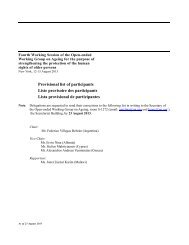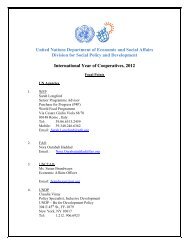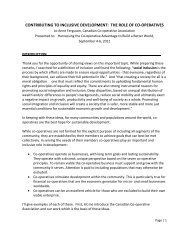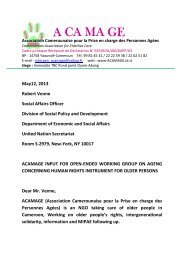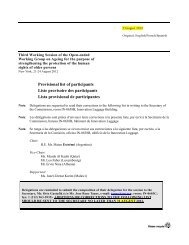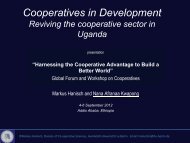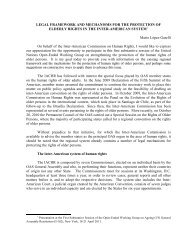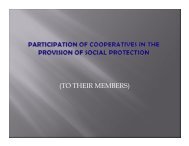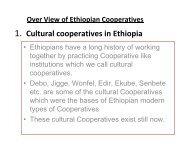Open-ended working group on Ageing for the purpose of ... - IAGG
Open-ended working group on Ageing for the purpose of ... - IAGG
Open-ended working group on Ageing for the purpose of ... - IAGG
You also want an ePaper? Increase the reach of your titles
YUMPU automatically turns print PDFs into web optimized ePapers that Google loves.
and just outcomes effectively. Ms. Sabatino stated that access to justice also requires<br />
having knowledge and awareness <strong>of</strong> <strong>the</strong> full range <strong>of</strong> rights <strong>of</strong> older citizens, having<br />
reas<strong>on</strong>able pathways to exercise those rights, and having reas<strong>on</strong>able legal resources and<br />
self-help avenues <strong>of</strong> redress to remedy and prevent <strong>the</strong> loss <strong>of</strong> those rights. Elder law rests<br />
<strong>on</strong> underlying values and goals as aut<strong>on</strong>omy, dignity, and quality <strong>of</strong> life, and c<strong>on</strong>centrates<br />
around three issues, namely housing, financial well-being, health and l<strong>on</strong>g-term care. Mr.<br />
Sabatino turned to examples <strong>of</strong> inadequacies in both normative law and implementati<strong>on</strong>:<br />
legal assistance to lower-income pers<strong>on</strong>s; adult guardianship; elder abuse and exploitati<strong>on</strong>;<br />
age discriminati<strong>on</strong>; courts and pris<strong>on</strong>s and ageing pris<strong>on</strong>ers; and voting rights.<br />
31. During <strong>the</strong> inter-active dialogue, some Member States and civil society<br />
organizati<strong>on</strong>s raised several related issues including: <strong>the</strong> possibility <strong>of</strong> out-<strong>of</strong>-court c<strong>on</strong>flict<br />
resoluti<strong>on</strong> to avoid legal c<strong>on</strong>fr<strong>on</strong>tati<strong>on</strong>; <strong>the</strong> possibility that <strong>the</strong> OEWG <strong>on</strong> <strong>Ageing</strong> develops<br />
tools to advance access to justice <strong>for</strong> older pers<strong>on</strong>s, as well as provisi<strong>on</strong>s that could be<br />
used <strong>for</strong> an internati<strong>on</strong>al legal framework; and <strong>the</strong> possibility <strong>of</strong> an internati<strong>on</strong>al human<br />
rights instrument to address <strong>the</strong> normative gaps with regard to access to justice, good<br />
practices <strong>of</strong> nati<strong>on</strong>al ombudspers<strong>on</strong>s, and dementia and guardianship. While human rights<br />
law applies to pers<strong>on</strong>s <strong>of</strong> all ages, some speakers felt that a c<strong>on</strong>venti<strong>on</strong> <strong>on</strong> <strong>the</strong> rights <strong>of</strong><br />
older pers<strong>on</strong>s would specify issues with regard to access to justice. Some existing regi<strong>on</strong>al<br />
and internati<strong>on</strong>al legal instruments address access to justice and could be used as a<br />
blueprint.<br />
IV. Closing Remarks by Chair<br />
32. In his closing remarks, <strong>the</strong> Chair summarized important <strong>the</strong>mes and discussi<strong>on</strong>s<br />
addressed during <strong>the</strong> interactive panel sessi<strong>on</strong>s. He highlighted several proposals and<br />
suggesti<strong>on</strong>s that were put <strong>for</strong>ward by Member States and civil society organisati<strong>on</strong>s.<br />
33. The Chair stated that it was evident, that Member States c<strong>on</strong>tinue to be interested<br />
in streng<strong>the</strong>ning <strong>the</strong> protecti<strong>on</strong> <strong>of</strong> <strong>the</strong> human rights <strong>of</strong> older pers<strong>on</strong>s. In appreciating <strong>the</strong><br />
opportunity to exchange views <strong>on</strong> ways to address this topic, <strong>the</strong> Chair noted diverging<br />
opini<strong>on</strong>s that had emerged during <strong>the</strong> debate. Certain Member States felt str<strong>on</strong>gly that <strong>the</strong><br />
human rights <strong>of</strong> older pers<strong>on</strong>s are protected by existing instruments, and that focus should<br />
be placed <strong>on</strong> implementati<strong>on</strong> through improved legal frameworks and building <strong>on</strong> existing<br />
nati<strong>on</strong>al, regi<strong>on</strong>al and internati<strong>on</strong>al instruments, with <strong>the</strong> understanding that <strong>the</strong> Madrid<br />
Internati<strong>on</strong>al Plan <strong>of</strong> Acti<strong>on</strong> <strong>on</strong> <strong>Ageing</strong> (MIPAA) is sufficient to protect <strong>the</strong> human rights<br />
<strong>of</strong> older pers<strong>on</strong>s.<br />
34. The Chair noted that some Member States focused <strong>the</strong>ir statements <strong>on</strong><br />
development and <strong>the</strong> need to ensure a more comprehensive protecti<strong>on</strong> <strong>of</strong> <strong>the</strong> human rights<br />
<strong>of</strong> older pers<strong>on</strong>s. O<strong>the</strong>rs stated that existing treaty bodies are already c<strong>on</strong>strained with<br />
heavy workload and limited timelines, and <strong>the</strong>re<strong>for</strong>e, could not be fur<strong>the</strong>r burdened with<br />
<strong>the</strong> resp<strong>on</strong>sibility <strong>of</strong> addressing <strong>the</strong> human rights <strong>of</strong> older pers<strong>on</strong>s. Some Member States<br />
suggested calling up<strong>on</strong> existing United Nati<strong>on</strong>s Rapporteurs, while o<strong>the</strong>rs recomm<str<strong>on</strong>g>ended</str<strong>on</strong>g><br />
asking <strong>for</strong> special procedures from <strong>the</strong> Human Rights Council to seek recommendati<strong>on</strong>s<br />
<strong>on</strong> how to better protect and promote <strong>the</strong> human rights <strong>of</strong> older pers<strong>on</strong>s. The Chair also<br />
noted that certain Member States, as well as civil society organisati<strong>on</strong>s, called <strong>for</strong> <strong>the</strong><br />
drafting <strong>of</strong> a new internati<strong>on</strong>al instrument; a United Nati<strong>on</strong>s c<strong>on</strong>venti<strong>on</strong> <strong>on</strong> <strong>the</strong> rights <strong>of</strong><br />
older pers<strong>on</strong>s, to provide a binding treaty that identifies <strong>the</strong> rights <strong>of</strong> older pers<strong>on</strong>s as well<br />
as <strong>the</strong> obligati<strong>on</strong>s <strong>of</strong> State parties to <strong>the</strong> c<strong>on</strong>venti<strong>on</strong>.<br />
9



